|
|
|
Sort Order |
|
|
|
Items / Page
|
|
|
|
|
|
|
| Srl | Item |
| 1 |
ID:
083747
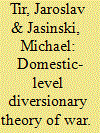

|
|
|
|
|
| Publication |
2008.
|
| Summary/Abstract |
According to the diversionary war theory, problematic domestic circumstances motivate a country's leader to divert popular discontent by launching a militarized international crisis. Yet, empirical support for this argument has proved to be ambiguous at best. Relying on extant ethnic conflict research, we argue that the embattled leader can elicit public support by using armed force against ethnic minorities within his/her country. We call this option domestic diversion and argue that it is not only available to a larger number of leaders, but that it also often presents a less risky course of action than external diversion. Empirical tests of the domestic diversionary hypothesis show a connection between domestic problems facing the leader and the use of force against minorities. This finding provides a potentially new interpretation for the causes of some domestic conflicts, and suggests that the diversionary theory may operate on the domestic level of analysis.
|
|
|
|
|
|
|
|
|
|
|
|
|
|
|
|
| 2 |
ID:
083746
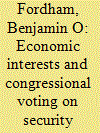

|
|
|
|
|
| Publication |
2008.
|
| Summary/Abstract |
Most research on congressional consideration of foreign and defense policy concludes that ideology is the most important influence on roll-call voting and that constituent economic interests are not very important. This article challenges this conclusion on two grounds. First, most previous research conceives of constituent economic interests on these issues very narrowly, examining only the benefits constituents obtain from providing military goods and services rather than their economic stakes in the broader goals of national security policy. Second, the effect of ideology on congressional voting has changed enormously over time, a fact that poses difficulties for research that has stressed this consideration. The effects of broader economic interests and the changing implications of ideology are tested using a sample of key Senate votes on military resource allocation, intervention, and foreign aid from 1947 through 2000.
|
|
|
|
|
|
|
|
|
|
|
|
|
|
|
|
| 3 |
ID:
083750
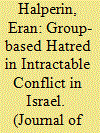

|
|
|
|
|
| Publication |
2008.
|
| Summary/Abstract |
Countless theoretical texts have been written regarding the centrality of hatred as a force that motivates intergroup conflicts. However, surprisingly, at present, almost no empirical study has been conducted either on the nature and character of group-based hatred or on its implications for conflicts. Therefore, the goal of the current work has been to examine the nature of group-based hatred in conflicts. Three studies were conducted within the context of the Israeli-Palestinian conflict. The first was a qualitative study, which aimed at creating a preliminary platform for investigation of specific features of group-based hatred. Studies 2 and 3 used various scenarios and survey methods to indicate the appraisal and the behavioral aspects of group-based hatred and to distill them from those of other negative emotions, such as anger or fear. In general, results show that hatred is a distinct emotion that includes a unique cognitive-appraisal component and specific emotional goals.
|
|
|
|
|
|
|
|
|
|
|
|
|
|
|
|
| 4 |
ID:
083749
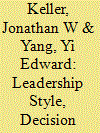

|
|
|
|
|
| Publication |
2008.
|
| Summary/Abstract |
The poliheuristic (PH) theory of decision making has made important contributions to our understanding of political decision making but remains silent about certain key aspects of the decision process. Specifically, PH theory contends that leaders screen out politically unacceptable options, but it provides no guidance on (1) the crucial threshold at which leaders reject options as politically unacceptable, (2) whether this threshold varies across leaders and situations, and, (3) if so, which factors shape variation in this threshold. We integrate PH theory with research on political leadership and decision context and derive hypotheses from this modified PH framework. An experimental test reveals that situational context and leadership style affect both (1) the ``noncompensatory threshold'' at which decision makers reject options as politically unacceptable and (2) how much decision makers rely on their constituents' views in making policy choices. We conclude that a modified PH theory incorporating these insights will have enhanced explanatory and predictive power.
|
|
|
|
|
|
|
|
|
|
|
|
|
|
|
|
| 5 |
ID:
083751
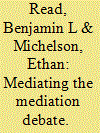

|
|
|
|
|
| Publication |
2008.
|
| Summary/Abstract |
China's elaborate system of local mediation committees has piqued researchers' curiosity for decades and sparked an argument in these pages. Crucial questions-concerning how much mediation actually takes place, what kinds of disputes are mediated, who seeks mediation, and how successful it is-have gone unanswered for lack of data. This article addresses these issues using original surveys from Beijing and villages in six provinces, supplemented by participant-observation research on actual instances of mediation. We find that mediation is fairly common in the country-side while occurring in a narrow set of contexts in the city. Those who are actively involved in institutions of grassroots governance are much more likely than others to seek such remedies, and in rural China, women pursue it more than men do. Modernization may diminish the salience of this form of dispute resolution, yet it is far from extinct, even in contemporary society
|
|
|
|
|
|
|
|
|
|
|
|
|
|
|
|
| 6 |
ID:
083748


|
|
|
|
|
| Publication |
2008.
|
| Summary/Abstract |
The authors investigate the strategic rationale behind the message sent by Osama bin Laden on the eve of the 2004 U.S. Presidential elections. They model this situation as a signaling game in which a population of receivers takes a binary choice, the outcome is decided by majority rule, sender and receivers have conflicting interests, and there is uncertainty about both players' degree of rationality. They characterize the structure of the sequential equilibria of the game as a function of the parameters governing the uncertainty and find that in all pure strategy equilibria, the outcome most preferred by the rational sender is chosen. An explanation of the above-mentioned events relies crucially on the relative likelihood of rational and naive players: If a sufficient departure from full rationality of the electorate is posited, then our model suggests that bin Laden's pre-electoral message succeeded in tilting the race toward his preferred outcome.
|
|
|
|
|
|
|
|
|
|
|
|
|
|
|
|
|
|
|
|
|